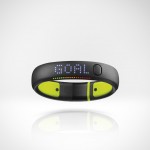
Wearable technologies for fitness are all the rage. From the Nike Fuel band to the Fitbit, the constant tracking of activity and instant feedback motivates many to gradually increase their fitness. Unless Santa is bringing a surprise, I can’t claim firsthand experience on whether the technology can help people implement the changes they desire, but I wonder if it might be a model for education. While others have postulated what these fitness devices tell us about learning, I wonder if a similar device could be created for mental fitness.
While there are many apps that one use to bring learning on the go via smartphone (such as Lumosity or iTunes U), I don’t know of a wearable device that is designed to enhance mental fitness. There are a few educational models that might drive the design of such a device:
- Regular, repeated content delivery: distributed practice has been shown to be an effective way to bolster long term retention of newly learned material. Perhaps reminders on a wristwatch (or in something like Google Glass) delivered by an app that knew the optimal content, time, and modality could make routine memorization easier.
- Connection to real world events: the news can be a great way to find a meaningful connection with the issues of the day. While this is another take on the idea of distributed practice, it’s another way that one might develop the mental frameworks for learning.
- Mind games: simple recall games, like the ones from Lumosity, might help build build generalized mental fitness — much like wearable physical fitness devices!
Other than the difficulties of designing content for exceedingly small screens, I can anticipate one other hurdle to implementing wearable learning fitness technology. The device could not act on it’s own; it would need to connect to another system (or systems) to organize the subjects that one is studying.
There’s also the question of whether learning fitness is as marketable as physical fitness.
